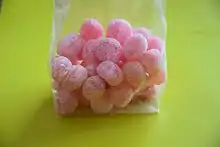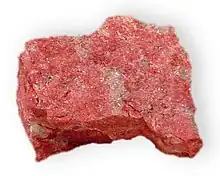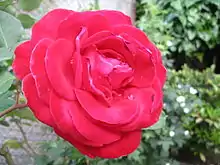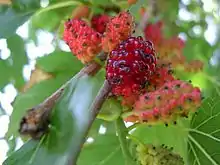Shades of rose
Rose is the color halfway between red and magenta on the HSV color wheel, also known as the RGB color wheel.

| Rose | |
|---|---|
| Hex triplet | #FF0080 |
| sRGBB (r, g, b) | (255, 0, 128) |
| HSV (h, s, v) | (330°, 100%, 100%) |
| CIELChuv (L, C, h) | (55, 143, 355°) |
| Source | By definition[1] |
| ISCC–NBS descriptor | Vivid purplish red |
| B: Normalized to [0–255] (byte) | |
Rose is one of the tertiary colors on the HSV color wheel. The complementary color of rose is spring green. Sometimes rose is quoted instead as the web-safe color FF00CC, which is closer to magenta than to red, corresponding to a hue angle near 320 degrees, or the web-safe color FF0077, which is closer to red than magenta, corresponding to a hue angle of about 340 degrees.
Variations of rose
Lavender blush
| Lavender blush | |
|---|---|
| Hex triplet | #FFF0F5 |
| sRGBB (r, g, b) | (255, 240, 245) |
| HSV (h, s, v) | (340°, 6%, 100%) |
| CIELChuv (L, C, h) | (96, 9, 347°) |
| Source | X11 |
| ISCC–NBS descriptor | Pinkish white |
| B: Normalized to [0–255] (byte) | |
This is the web color lavender blush. It is a very pale shade of rose.
Misty rose
| Misty rose | |
|---|---|
| Hex triplet | #FFE4E1 |
| sRGBB (r, g, b) | (255, 228, 225) |
| HSV (h, s, v) | (6°, 12%, 100%) |
| CIELChuv (L, C, h) | (93, 17, 19°) |
| Source | X11 |
| ISCC–NBS descriptor | Pinkish white |
| B: Normalized to [0–255] (byte) | |
Misty rose
#ffe4e1
Misty rose is a pale shade of rose. It is also a web color.
Tickle me pink
| Tickle me pink | |
|---|---|
| Hex triplet | #FC89AC |
| sRGBB (r, g, b) | (252, 137, 172) |
| HSV (h, s, v) | (342°, 46%, 99%) |
| CIELChuv (L, C, h) | (71, 74, 355°) |
| Source | Crayola |
| ISCC–NBS descriptor | Strong purplish pink |
| B: Normalized to [0–255] (byte) | |
The color tickle me pink was formulated by Crayola in 1993.
Persian pink
| Persian pink | |
|---|---|
| Hex triplet | #F77FBE |
| sRGBB (r, g, b) | (247, 127, 190) |
| HSV (h, s, v) | (328°, 49%, 97%) |
| CIELChuv (L, C, h) | (69, 76, 339°) |
| Source | Maerz and Paul[2] |
| ISCC–NBS descriptor | Deep purplish pink |
| B: Normalized to [0–255] (byte) | |
Since the color rose is so well loved in Persia (Iran), some shades of rose are named after Persia, such as the light tone of rose of this color called Persian pink. This color is very popular in women's fashion.
The first recorded use of Persian pink as a color name in English was in 1922.[3]
Rose pink
| Rose pink | |
|---|---|
| Hex triplet | #FF66CC |
| sRGBB (r, g, b) | (255, 102, 204) |
| HSV (h, s, v) | (320°, 60%, 100%) |
| CIELChuv (L, C, h) | (66, 97, 331°) |
| Source | ColorHexa[4] |
| ISCC–NBS descriptor | Vivid reddish purple |
| B: Normalized to [0–255] (byte) | |
The first recorded use of rose pink as a color name in English was in 1760.[5]
Rose bonbon
| Rose bonbon | |
|---|---|
| Hex triplet | #F9429E |
| sRGBB (r, g, b) | (249, 66, 158) |
| HSV (h, s, v) | (330°, 73%, 98%) |
| CIELChuv (L, C, h) | (59, 114, 347°) |
| Source | Pourpre.com |
| ISCC–NBS descriptor | Vivid purplish red |
| B: Normalized to [0–255] (byte) | |
Rose bonbon
#f9429e
The name rose bonbon translates loosely from French into English as candy rose or candy pink, or more specifically as bonbon rose or bonbon pink – presumably referring to bonbons that are coated with icing that is colored rose bonbon.

Rose bonbon is a tone of rose that is popular in France.
Brilliant rose
| Brilliant rose | |
|---|---|
| Hex triplet | #F653A6 |
| sRGBB (r, g, b) | (246, 83, 166) |
| HSV (h, s, v) | (329°, 66%, 96%) |
| CIELChuv (L, C, h) | (60, 102, 344°) |
| Source | Crayola |
| ISCC–NBS descriptor | Vivid purplish red |
| B: Normalized to [0–255] (byte) | |
Brilliant rose
#f653a6
The color brilliant rose is a Crayola color formulated in 1949, but the name was changed in 1958 to magenta.
The original name is more accurate since this color, having a hue code of 329, is much closer to rose than (web color) magenta.
Thulian pink
| Thulian pink | |
|---|---|
| Hex triplet | #DE6FA1 |
| sRGBB (r, g, b) | (222, 111, 161) |
| HSV (h, s, v) | (333°, 50%, 87%) |
| CIELChuv (L, C, h) | (61, 71, 345°) |
| Source | ISCC-NBS |
| ISCC–NBS descriptor | Deep purplish pink |
| B: Normalized to [0–255] (byte) | |
Thulian pink
#de6fa1
The color Thulian pink is also called Thulite pink; the first recorded use of Thulite pink as a color name in English was in 1912.[6]
The term Thulian pink refers to the land of Thule.
Another name for this color is first lady. The first use of first lady as a color name in English was when the Plochere Color System (widely used by interior designers) was inaugurated in 1948.[7]

The hex code for Thulian pink is identical to that of China pink and Liseran purple.
French rose
| French rose | |
|---|---|
| Hex triplet | #F64A8A |
| sRGBB (r, g, b) | (246, 74, 138) |
| HSV (h, s, v) | (338°, 70%, 96%) |
| CIELChuv (L, C, h) | (58, 113, 355°) |
| Source | Internet |
| ISCC–NBS descriptor | Vivid purplish red |
| B: Normalized to [0–255] (byte) | |
French rose
#f64a8a
The color French rose is also called France rose.
The first recorded use of France rose as a color name in English was in 1926.[8]
Color sample of French rose—this color matches exactly the color sample shown as "France rose" in the 1930 book by Maerz and Paul A Dictionary of Color.
Razzmatazz
| Razzmatazz | |
|---|---|
| Hex triplet | #E3256B |
| sRGBB (r, g, b) | (227, 37, 107) |
| HSV (h, s, v) | (338°, 84%, 89%) |
| CIELChuv (L, C, h) | (50, 123, 359°) |
| Source | Crayola |
| ISCC–NBS descriptor | Vivid red |
| B: Normalized to [0–255] (byte) | |
Razzmatazz
#e3256b
The color Razzmatazz is a rich shade of crimson-rose.
Razzmatazz was a new Crayola crayon color chosen in 1993 as a part of the Name The New Colors Contest.
It was named by then 5-year-old Laura Bartolomei-Hill. She was the youngest winner of Crayola's "Name the New Colors Contest."
Razzle dazzle rose
| Razzle dazzle rose | |
|---|---|
| Hex triplet | #FF33CC |
| sRGBB (r, g, b) | (255, 51, 204) |
| HSV (h, s, v) | (315°, 80%, 100%) |
| CIELChuv (L, C, h) | (60, 119, 328°) |
| Source | Crayola |
| ISCC–NBS descriptor | Vivid reddish purple |
| B: Normalized to [0–255] (byte) | |
Razzle dazzle rose
#ff33cc
The color razzle dazzle rose is a vivid tone of rose tending toward magenta.
The color razzle dazzle rose was named by Crayola in 1990. Before that, from its formulation in 1972 to 1990, it had been named hot magenta.
Persian rose
| Persian rose | |
|---|---|
| Hex triplet | #FE28A2 |
| sRGBB (r, g, b) | (254, 40, 162) |
| HSV (h, s, v) | (326°, 84%, 100%) |
| CIELChuv (L, C, h) | (57, 125, 344°) |
| Source | Maerz and Paul |
| ISCC–NBS descriptor | Vivid purplish red |
| B: Normalized to [0–255] (byte) | |
Persian rose
#fe28a2
The first recorded use of Persian rose as a color name in English was in 1921.[9][10]
This color matches the color of the Persian rose color sample in A Dictionary of Color—a highly saturated color close to the outer surface of the color sphere, just below the equator of the color sphere, about halfway between rose and magenta. The color Persian rose may also be described as a color close to the purple boundary of the CIE chromaticity diagram about halfway between rose and magenta.
Fuchsia rose
| Fuchsia rose | |
|---|---|
| Hex triplet | #C74375 |
| sRGBB (r, g, b) | (199, 67, 117) |
| HSV (h, s, v) | (337°, 66%, 78%) |
| CIELChuv (L, C, h) | (49, 86, 354°) |
| Source | Pantone TPX[11] |
| ISCC–NBS descriptor | Strong purplish red |
| B: Normalized to [0–255] (byte) | |
Fuchsia rose
#c74375
Fuchsia rose is the color that was chosen as the 2001 Pantone color of the year by Pantone.
The source of this color is the "Pantone Textile Paper eXtended (TPX)" color list, color #17-2031 TPX—Fuchsia rose.[12]
Rose red
| Rose red | |
|---|---|
| Hex triplet | #C21E56 |
| sRGBB (r, g, b) | (194, 30, 86) |
| HSV (h, s, v) | (340°, 85%, 76%) |
| CIELChuv (L, C, h) | (43, 107, 0°) |
| Source | Pantone TPX[13] |
| ISCC–NBS descriptor | Vivid red |
| B: Normalized to [0–255] (byte) | |

The source of rose red is the "Pantone Textile Paper eXtended (TPX)" color list, color #18-1852 TPX—Rose red.[14]
Telemagenta
| Telemagenta | |
|---|---|
| Hex triplet | #CF3476 |
| sRGBB (r, g, b) | (207, 52, 118) |
| HSV (h, s, v) | (334°, 75%, 81%) |
| CIELChuv (L, C, h) | (48, 98, 353°) |
| Source | RAL |
| ISCC–NBS descriptor | Vivid purplish red |
| B: Normalized to [0–255] (byte) | |
The color telemagenta is one of the colors in the RAL color matching system, a color system widely used in Europe. The RAL color list first originated in 1927, and it reached its present form in 1961.
Dogwood rose
| Dogwood rose | |
|---|---|
| Hex triplet | #D71868 |
| sRGBB (r, g, b) | (215, 24, 104) |
| HSV (h, s, v) | (335°, 89%, 84%) |
| CIELChuv (L, C, h) | (47, 118, 357°) |
| Source | Colorhexa.com[15] |
| ISCC–NBS descriptor | Vivid red |
| B: Normalized to [0–255] (byte) | |
.jpg.webp)
The color dogwood rose is sometimes called dogwood red. Dogwood rose in nature:[16]
Raspberry rose
| Raspberry rose | |
|---|---|
| Hex triplet | #B3446C |
| sRGBB (r, g, b) | (179, 68, 108) |
| HSV (h, s, v) | (338°, 62%, 70%) |
| CIELChuv (L, C, h) | (45, 72, 354°) |
| Source | ISCC-NBS |
| ISCC–NBS descriptor | Moderate purplish red |
| B: Normalized to [0–255] (byte) | |
This is the color raspberry rose.
China rose
| China rose | |
|---|---|
| Hex triplet | #A8516E |
| sRGBB (r, g, b) | (168, 81, 110) |
| HSV (h, s, v) | (340°, 52%, 66%) |
| CIELChuv (L, C, h) | (46, 56, 353°) |
| Source | ISCC-NBS |
| ISCC–NBS descriptor | Moderate purplish red |
| B: Normalized to [0–255] (byte) | |
The color China rose is a deep tone of rose.
The first recorded use of China rose as a color name in English was in 1925.[17]
Folly
| Folly | |
|---|---|
| Hex triplet | #FF004F |
| sRGBB (r, g, b) | (255, 0, 79) |
| HSV (h, s, v) | (341°, 100%, 100%) |
| CIELChuv (L, C, h) | (54, 162, 6°) |
| Source | |
| ISCC–NBS descriptor | Reddish-Pinkish |
| B: Normalized to [0–255] (byte) | |
This is the color Folly.
Ruby
| Ruby | |
|---|---|
| Hex triplet | #E0115F |
| sRGBB (r, g, b) | (224, 17, 95) |
| HSV (h, s, v) | (337°, 92%, 88%) |
| CIELChuv (L, C, h) | (48, 130, 1°) |
| Source | Maerz and Paul[18] |
| ISCC–NBS descriptor | Vivid red |
| B: Normalized to [0–255] (byte) | |

Ruby is a color that is a representation of the color of the cut and polished ruby gemstone. Ruby as a color is more akin to rose than red.
Liseran purple
| Liseran Purple | |
|---|---|
| Hex triplet | #DE6FA1 |
| sRGBB (r, g, b) | (222, 111, 161) |
| HSV (h, s, v) | (333°, 50%, 87%) |
| CIELChuv (L, C, h) | (61, 71, 345°) |
| Source | ISCC-NBS [19] |
| ISCC–NBS descriptor | Deep purplish pink |
| B: Normalized to [0–255] (byte) | |
The first recorded use of liseran purple as a color name in English was in 1912.[20]
Pearly purple
| Pearly Purple | |
|---|---|
| Hex triplet | #B768A2 |
| sRGBB (r, g, b) | (183, 104, 162) |
| HSV (h, s, v) | (316°, 43%, 72%) |
| CIELChuv (L, C, h) | (55, 54, 323°) |
| Source | Crayola |
| ISCC–NBS descriptor | Strong reddish purple |
| B: Normalized to [0–255] (byte) | |
Pearly purple is one of the colors in the special set of metallic colored Crayola crayons called Silver Swirls, the colors of which were formulated by Crayola in 1990.
Mulberry
| Mulberry | |
|---|---|
| Hex triplet | #C54B8C |
| sRGBB (r, g, b) | (197, 75, 140) |
| HSV (h, s, v) | (328°, 62%, 77%) |
| CIELChuv (L, C, h) | (50, 77, 341°) |
| Source | Crayola |
| ISCC–NBS descriptor | Strong purplish red |
| B: Normalized to [0–255] (byte) | |

The color mulberry is a representation of the color of mulberry jam or pie. This was a Crayola crayon color from 1958 to 2003.
The first recorded use of mulberry as a color name in English was in 1776.[21]
French (Canada) Rose
| French (Canada) Rose | |
|---|---|
| Hex triplet | #ED438D |
| sRGBB (r, g, b) | (237, 67, 141) |
| HSV (h, s, v) | (334°, 72%, 93%) |
| CIELChuv (L, C, h) | (56, 109, 351°) |
| Source | https://perbang.dk/rgb/ED438D] |
| ISCC–NBS descriptor | Brillant raspberry |
| B: Normalized to [0–255] (byte) | |
French (Canada) rose is one of the brilliant raspberry color.
See also
- Amaranth (color)
- Cerise (color)
- Fuchsia (color)
- Toulouse: "La Ville rose"
- List of colors
References
- On the RGB color wheel, derived from RGB color space, the color rose is defined as the tertiary color that is at a hue angle of 330 degrees.
- The color shown in the Persian Pink color box matches the color sample in the following book: Maerz and Paul A Dictionary of Color New York:1930 McGraw-Hill Page 201; Color Sample of Persian Pink: Page 29 Plate 3 Color Sample H4.
- Maerz and Paul A Dictionary of Color New York:1930 McGraw-Hill Page 201; Color Sample of Persian Pink: Page 29 Plate 3 Color Sample H4. Note: The color shown above matches the color sample in this book.
- "Rose pink / #ff66cc hex color (#f6c)". ColorHexa. Retrieved 7 December 2021.
- Maerz and Paul A Dictionary of Color New York:1930 McGraw-Hill Page 203
- Maerz and Paul A Dictionary of Color New York:1930 McGraw-Hill Page 205; Color Sample of Thulite pink: Page 25 Plate 50 Color Sample I1
- Plochere Color System: Archived 4 October 2008 at the Wayback Machine
- Maerz and Paul A Dictionary of Color New York:1930 McGraw-Hill Page 195 Color Sample of France rose: Page 25 Plate 1 Color Sample F4
- Maerz and Paul A Dictionary of Color New York:1930 McGraw-Hill Page 201; Color Sample of Persian rose: Page 123 Plate 50 Color Sample K7 Note: The color sample shown above matches the color sample in this book.
- Picture of a Persian rose
- Type the words "Fuchsia rose" into the indicated window on the Pantone Color Finder and the color will appear.
- Pantone TPX Pantone Color Finder—Type the words "Fuchsia rose" into the indicated window on the Pantone Color Finder and the color will appear:
- Type the words "Rose Red" into the indicated window on the Pantone Color Finder and the color will appear.
- Pantone TPX Pantone Color Finder—Type the words "Rose Red" into the indicated window on the Pantone Color Finder and the color will appear:
- Dogwood rose / #d71868 hex color
- Dogwood rose colored leaves in a garden:
- Maerz and Paul A Dictionary of Color New York:1930 McGraw-Hill Page 192; color sample of China rose: Page 33 Plate 5 Color Sample A6
- The color displayed in the color box above matches the color called ruby in the 1930 book by Maerz and Paul A Dictionary of Color New York:1930 McGraw-Hill; the color ruby is displayed on page 35, Plate 6, Color Sample G6.
- The color displayed in the color box above is the color in the array of tones of liseran purple displayed on the ISCC-NBS color list letter L web page that most closely matches the color called liseran purple in the 1930 book by Maerz and Paul A Dictionary of Color New York:1930 McGraw-Hill; the color liseran purple is displayed on page 123, Plate 50, Color Sample B9.
- Maerz and Paul A Dictionary of Color New York:1930 McGraw-Hill Page 198; Color Sample of Liseran Purple: Page 123 Plate 50 Color Sample B9
- Maerz and Paul A Dictionary of Color New York:1930 McGraw-Hill Page 199; Color Sample of Mulberry: Plate 48 Color Sample E9
External links
- ISCC-NBS Dictionary of Color Names (1955) – Color dictionary used by stamp collectors to identify the colors of stamps – See sample of the color [Dark] Persian rose (color sample #254) displayed on indicated page.
- ISCC-NBS Dictionary of Color Names (1955) – Color Sample of Tea rose (color sample #28)





